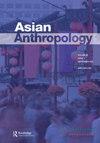在商人网络和记忆工作之间:丝绸之路沿线的伊斯兰世界主义
Q2 Social Sciences
引用次数: 0
摘要
摘要在过去的二十年里,在亚洲伊斯兰世界主义研究中,商人网络和宗教流动受到了学术界的广泛关注。然而,仍需要更多的研究来了解记忆是如何起作用的——尤其是流散社区创伤的历史记忆——是如何促成亚洲穆斯林的跨国联系的。本文以“一带一路”倡议倡议为背景,重点探讨商人网络和记忆工作如何促进亚洲伊斯兰世界主义的发展。在2015年至2020年的实地调查基础上,我的民族志揭示,随着华文穆斯林在中国和中亚之间流动,纪念仪式和生存叙事与商业网络纠缠在一起。穆斯林个人和协会在努力通过仪式保存历史创伤记忆的同时,也通过遗产表演选择性地淡化种族宗教冲突的过去。换言之,华文穆斯林通过记忆和选择性遗忘转向创伤记忆,这是促进“一带一路”倡议官方话语之外的联系的关键。本文章由计算机程序翻译,如有差异,请以英文原文为准。
Between merchant network and memory work: Islamic cosmopolitanism along the Silk Road
Abstract In the studies of Islamic cosmopolitanism in Asia, merchant networks and religious mobility have received much scholarly attention in the past two decades. Yet, more studies are still needed to understand how memory work—especially the historical memory of trauma among diasporic communities—contributes to the transnational connections in Muslim Asia. Situated in the context of the Belt and Road Initiative (BRI), this article focuses on how merchant networks and memory work contribute to fostering Islamic cosmopolitanism in Asia. Building upon fieldwork between 2015 and 2020, my ethnography reveals that remembrance rituals and survival narratives become entangled with the merchant networks as Sinophone Muslims move between China and Central Asia. While striving to preserve the memory of historical trauma through rituals, Muslim individuals and associations also selectively downplay the past of ethnoreligious conflicts through heritage performance. In other words, Sinophone Muslims turn to traumatic memory through both remembering and selective oblivion, which is key to facilitating connections beyond the official BRI discourse.
求助全文
通过发布文献求助,成功后即可免费获取论文全文。
去求助
来源期刊

Asian anthropology
Social Sciences-Anthropology
CiteScore
1.60
自引率
0.00%
发文量
25
期刊介绍:
Asian Anthropology seeks to bring interesting and exciting new anthropological research on Asia to a global audience. Until recently, anthropologists writing on a range of Asian topics in English but seeking a global audience have had to depend largely on Western-based journals to publish their works. Given the increasing number of indigenous anthropologists and anthropologists based in Asia, as well as the increasing interest in Asia among anthropologists everywhere, it is important to have an anthropology journal that is refereed on a global basis but that is editorially Asian-based. Asian Anthropology is editorially based in Hong Kong, Taiwan, and Japan, but welcomes contributions from anthropologists and anthropology-related scholars throughout the world with an interest in Asia, especially East Asia as well as Southeast and South Asia. While the language of the journal is English, we also seek original works translated into English, which will facilitate greater participation and scholarly exchange. The journal will provide a forum for anthropologists working on Asia, in the broadest sense of the term "Asia". We seek your general support through submissions, subscriptions, and comments.
 求助内容:
求助内容: 应助结果提醒方式:
应助结果提醒方式:


